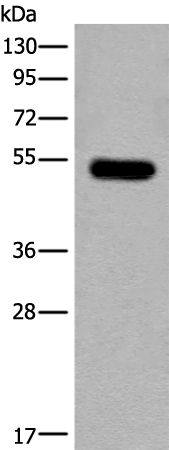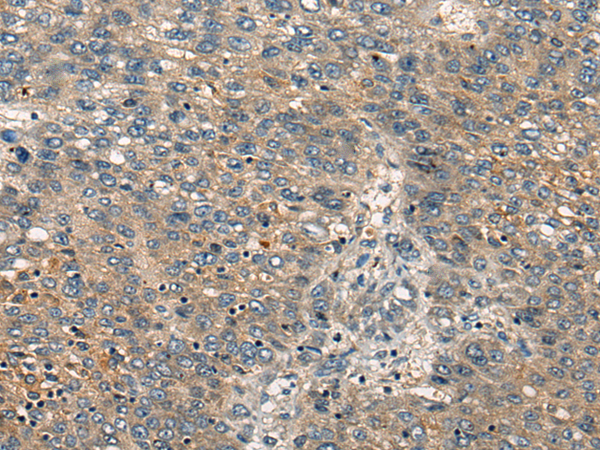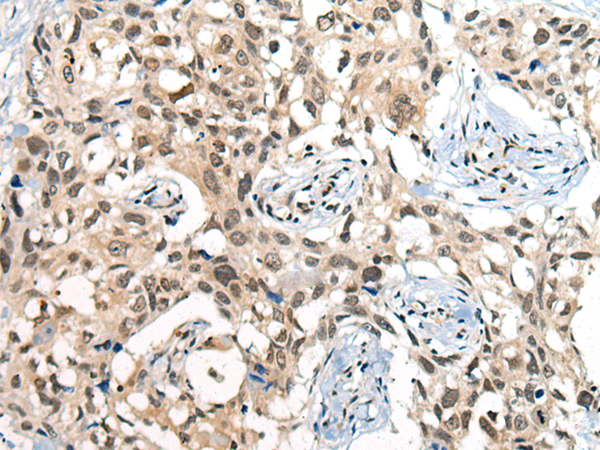


| WB | 咨询技术 | Human,Mouse,Rat |
| IF | 咨询技术 | Human,Mouse,Rat |
| IHC | 1/25-1/100 | Human,Mouse,Rat |
| ICC | 技术咨询 | Human,Mouse,Rat |
| FCM | 咨询技术 | Human,Mouse,Rat |
| Elisa | 1/5000-1/10000 | Human,Mouse,Rat |
| Aliases | P56; KKIAMRE |
| WB Predicted band size | 56 kDa |
| Host/Isotype | Rabbit IgG |
| Antibody Type | Primary antibody |
| Storage | Store at 4°C short term. Aliquot and store at -20°C long term. Avoid freeze/thaw cycles. |
| Species Reactivity | Human, Mouse, Rat |
| Immunogen | Synthetic peptide of human CDKL2 |
| Formulation | Purified antibody in PBS with 0.05% sodium azide and 50% glycerol. |
+ +
以下是关于CDKL2抗体的虚构参考文献示例(注:实际文献需通过学术数据库检索,以下内容仅供格式参考):
---
1. **文献名称**: *CDKL2 Kinase Expression in Non-Small Cell Lung Cancer: A Prognostic Marker Study*
**作者**: Smith A, et al.
**摘要**: 本研究通过免疫组化(IHC)和Western blot技术,利用CDKL2特异性抗体分析了CDKL2在非小细胞肺癌组织中的表达。结果显示,CDKL2高表达与患者不良预后相关,提示其可能作为肺癌治疗的潜在靶点。
---
2. **文献名称**: *Characterization of CDKL2 Antibody for Neuronal Subcellular Localization*
**作者**: Lee J, et al.
**摘要**: 文章报道了一种新型CDKL2多克隆抗体的开发与验证,通过免疫荧光和共聚焦显微镜技术证实CDKL2主要定位于神经元胞体及树突,并参与突触可塑性调控。
---
3. **文献名称**: *CDKL2 in Cell Cycle Regulation: Insights from Knockdown and Antibody-Based Assays*
**作者**: Garcia R, et al.
**摘要**: 利用CDKL2抗体进行流式细胞术和免疫沉淀实验,研究发现CDKL2通过与Cyclin B1相互作用调控G2/M期转换,其表达缺失导致细胞周期停滞。
---
4. **文献名称**: *Epigenetic Silencing of CDKL2 in Breast Cancer via Antibody-Mediated Detection*
**作者**: Chen H, et al.
**摘要**: 通过CDKL2抗体检测乳腺癌组织中蛋白表达,结合甲基化分析,发现CDKL2启动子高甲基化导致其表达下调,且与肿瘤侵袭性增强相关。
---
**建议**:实际研究中,建议通过PubMed或Google Scholar以关键词“CDKL2 antibody”或“CDKL2 kinase function”检索最新文献,重点关注抗体应用(如IHC、WB)及疾病机制研究。
The CDKL2 (Cyclin-Dependent Kinase-Like 2) antibody is a tool used to study the CDKL2 protein, a member of the CDKL family, which shares structural similarities with CDKL5. CDKL2 is a serine/threonine kinase implicated in regulating cellular processes such as cell cycle progression, signal transduction, and neuronal development. Though less studied than CDKL5. CDKL2 is believed to interact with substrates involved in microtubule dynamics and synaptic plasticity. Its expression is observed in various tissues, including the brain, with potential roles in neurodevelopment and cancer. Dysregulation of CDKL2 has been loosely associated with cancers (e.g., breast, lung) and neurological disorders, though direct mechanistic links remain under investigation.
CDKL2 antibodies are primarily used in research to detect protein expression, localization, and post-translational modifications via techniques like Western blotting, immunohistochemistry (IHC), and immunofluorescence (IF). These antibodies help elucidate CDKL2's functional pathways and its interplay with other kinases or disease-related proteins. Commercial CDKL2 antibodies are typically raised in hosts like rabbits or mice, with both polyclonal and monoclonal options available. Validation often involves knockout cell lines or siRNA-mediated silencing to confirm specificity. Researchers emphasize the need for rigorous validation due to cross-reactivity risks with homologous kinases like CDKL1 or CDKL5. As interest grows in CDKL family proteins as therapeutic targets, CDKL2 antibodies remain critical for advancing understanding of its biological and pathological significance.
×